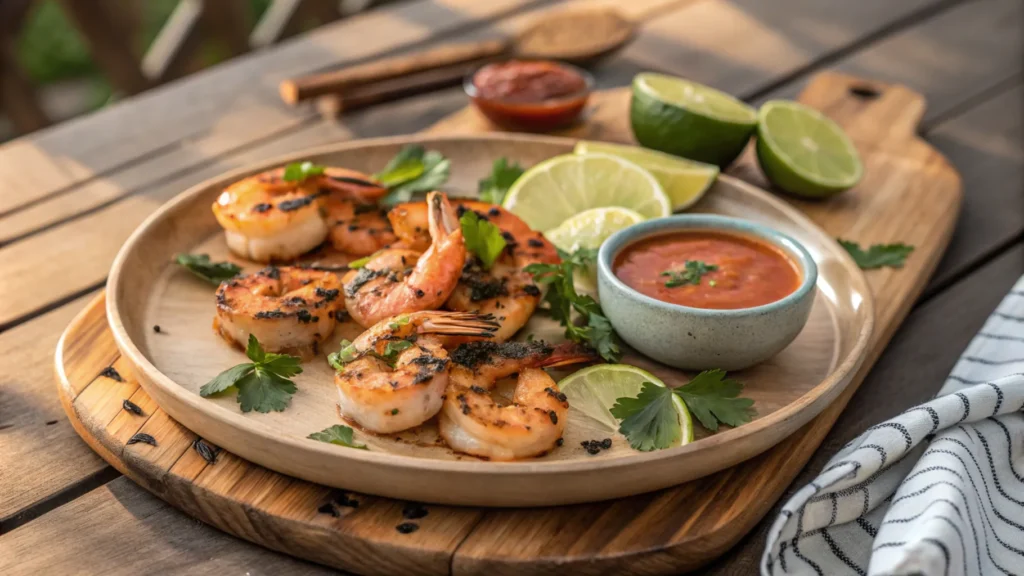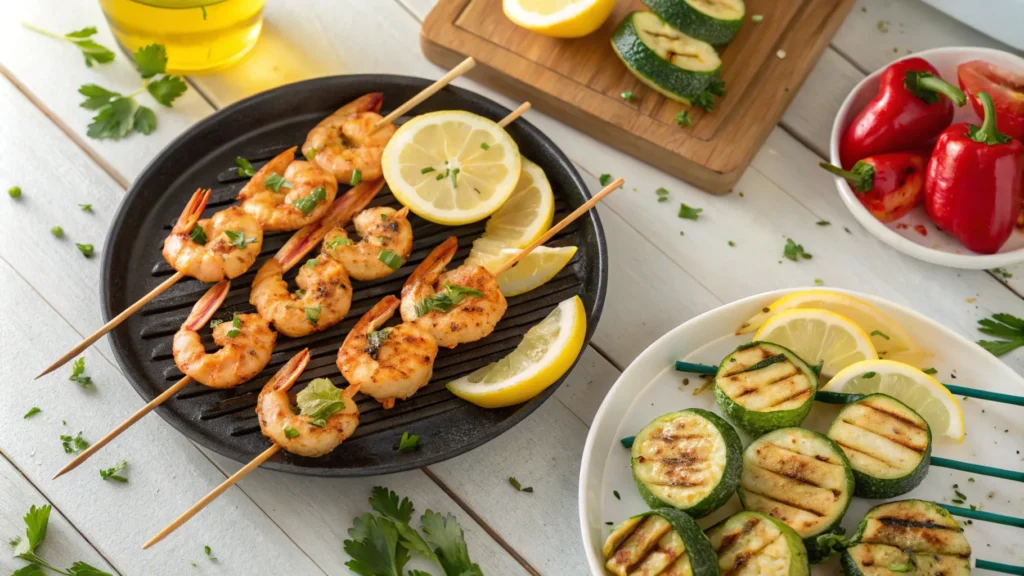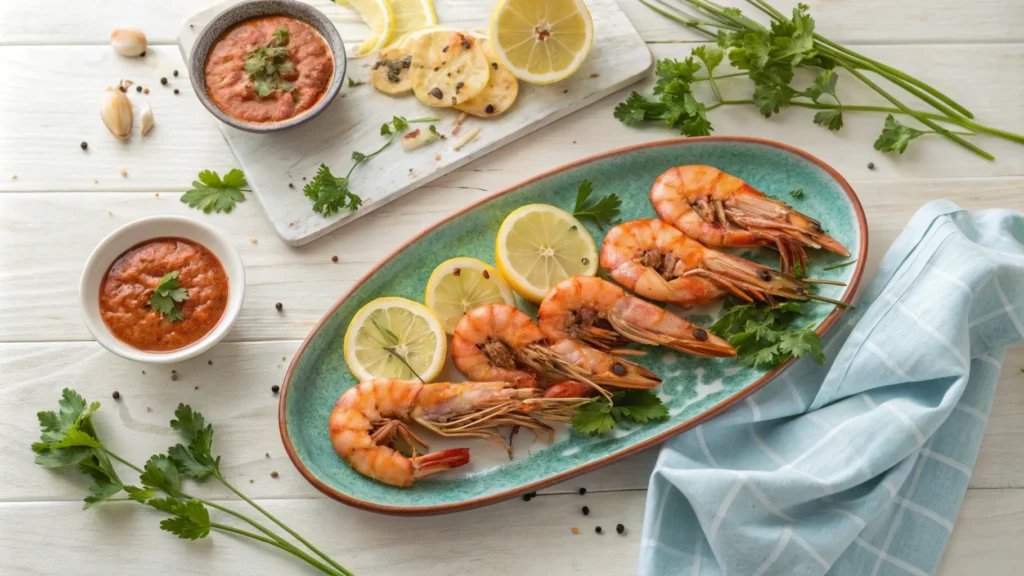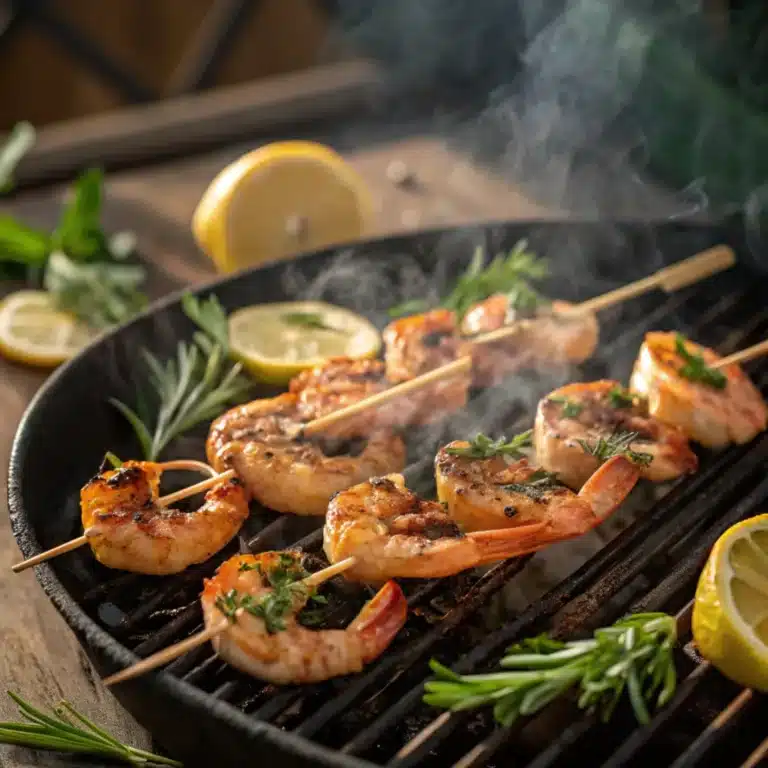Is it better to barbecue shrimp with shell on or off?
When it comes to barbecuing shrimp, there’s an ongoing debate: should you grill them with the shell on or shell off? This seemingly minor decision can have a huge impact on flavor, texture, and overall experience. In this article, we’ll dive into the pros and cons of both methods, offering expert tips and practical advice to help you make the best choice for your next cookout.
By the end, you’ll not only know the answer to the question, “Is it better to barbecue shrimp with shell on or off?” but also have some handy tips for grilling shrimp perfectly, no matter which approach you choose.
Table of contents
Understanding the Debate
What Makes Shrimp a Popular Choice for Barbecuing?
Shrimp are a favorite for grilling because they’re quick to cook, bursting with flavor, and incredibly versatile. Whether served as an appetizer, a main dish, or part of a surf-and-turf feast, shrimp bring a delicate, sweet flavor that pairs perfectly with smoky, grilled undertones. Plus, they absorb marinades and seasonings like a sponge, making them the ideal canvas for bold barbecue flavors.
Key Differences Between Shell-On and Shell-Off Shrimp
The main difference lies in how the shell affects cooking and eating. Shell-on shrimp create a natural barrier, locking in juices and adding a subtle smoky flavor as the shell chars on the grill. On the flip side, grilling shrimp without the shell allows marinades and seasonings to penetrate deeper into the meat, creating a more robust flavor.
But it’s not all about taste. There’s also the matter of convenience. Shell-on shrimp can be tricky to peel once they’re cooked, especially when served hot off the grill. Meanwhile, shell-off shrimp are easier to eat, making them a more guest-friendly option. The choice boils down to balancing flavor, ease of preparation, and personal preference.
This divide has left home cooks and grill masters passionately debating which method reigns supreme. In the next sections, we’ll weigh the pros and cons of each approach and share tips to make your shrimp barbecue a success.
Pros of Barbecuing Shrimp with Shell On
Flavor Retention: How the Shell Improves Taste
One of the biggest reasons to barbecue shrimp with the shell on is flavor. The shell acts like a protective barrier, locking in the shrimp’s natural juices as it cooks. This helps preserve the sweet, briny taste that shrimp are known for. As the shell chars on the grill, it also adds a subtle smoky aroma that Improves the shrimp’s overall flavor profile.
Additionally, the shell on method secures the meat remains tender and moist, even when exposed to high grilling temperatures. This is especially helpful when cooking jumbo shrimp, which can dry out quickly if left unprotected. If you’re looking to answer the question, “Is it better to barbecue shrimp with shell on or off?” the promise of richer flavor makes a strong case for leaving the shell intact.

Heat Protection: Avoiding Overcooking on the Grill
Shrimp cook fast—sometimes in as little as 5–7 minutes. Without their shells, they can easily overcook, turning rubbery and tough. Grilling shrimp with the shell on prevents direct heat from scorching the delicate flesh. The shell creates a layer of insulation, ensuring the meat cooks evenly and stays juicy.
This protective barrier is especially handy for inexperienced grillers who might struggle with timing. Even if you leave the shrimp on the grill a little too long, the shell provides a buffer against dryness.
Smoky Aroma: The Role of Charring the Shell
When shrimp shells hit the grill, they take on a golden, slightly charred appearance. This charring process not only adds visual appeal but also imparts a rich, smoky aroma that Promotes the dish. For purists who love the taste of fire-grilled seafood, leaving the shell on is a no-brainer.
Ease of Marination with Shell-On Shrimp
Marinating shrimp with their shells on might sound tricky, but it’s surprisingly effective. The shell holds the marinade close to the meat, allowing the flavors to seep in during cooking. Citrus-based marinades, in particular, work well, as the acidity breaks down the shell slightly, enhancing the infusion of flavors.
Cons of Barbecuing Shrimp with Shell On
Peeling Challenges: The Difficulty of Eating Shell-On Shrimp
While grilling shrimp with the shell on has its benefits, it comes with a major drawback: peeling. Once cooked, the shell can be challenging to remove, especially when it’s hot and sticky with seasoning. This can make eating a bit messy, which some diners might find off-putting, particularly at gatherings or formal occasions.
If you’re hosting guests who prefer easy-to-eat foods, shell-on shrimp may not be the best choice. This downside often raises the question, “Is it better to barbecue shrimp with shell on or off?” Convenience often wins when feeding a crowd.
Flavor Limitations: Marinade Penetration Issues
While the shell can improve flavor in some ways, it also blocks marinades and seasonings from deeply penetrating the meat. If you’re relying on bold spice rubs or flavorful marinades, the shell may act as a barrier, leaving the inner meat less seasoned than expected. This is particularly noticeable with dry rubs that need direct contact with the shrimp.
For those who prioritize seasoning over natural shrimp flavor, grilling shell-on might feel limiting.
Cooking Time: Does Shell-On Extend the Process?
Grilling shrimp with their shells on can also slightly extend the cooking time. The shell absorbs some of the heat, meaning the meat takes a bit longer to cook through. While this isn’t a significant issue for many, it can be inconvenient if you’re juggling multiple items on the grill or trying to cook for a large group.
In short, while shell-on grilling has its perks, it’s not without its challenges. If convenience and intense seasoning are top priorities, shell-off shrimp might be a better fit.
Pros of Barbecuing Shrimp with Shell Off
Improved Marinade Absorption
Grilling shrimp without the shell allows marinades and seasonings to penetrate directly into the meat, delivering a more intense and evenly distributed flavor. Whether you’re using a spicy Cajun rub or a tangy lemon-garlic marinade, shell-off shrimp absorb every bit of seasoning, making each bite more flavorful. For those who enjoy experimenting with bold or complex spice blends, going shell-off might be the best route to answer the question, “Is it better to barbecue shrimp with shell on or off?”

Convenience for Guests: Shell-Free Serving Benefits
Shell-off shrimp make for a smooth dining experience, especially at parties or family gatherings. Without the hassle of peeling, guests can dive right in and enjoy the shrimp without pause. This added convenience makes shell-off shrimp a practical choice when hosting a crowd, where ease often outweighs other factors.
Quicker Grilling Time for Shell-Off Shrimp
Without the shell acting as a protective barrier, shell-off shrimp cook faster. This makes them ideal for quick weeknight dinners or when you’re managing multiple dishes on the grill. Additionally, the faster cooking time secures that the shrimp maintain a tender texture, provided you keep a close eye on them while grilling.
For more inspiration, try this Easy BBQ Shrimp Recipe to test the benefits of grilling shrimp without shells.
Cons of Barbecuing Shrimp with Shell Off
Risks of Overcooking Without the Shell
One major drawback of grilling shrimp without the shell is the increased risk of overcooking. Without the shell’s protective layer, the shrimp are more exposed to direct heat, which can cause them to dry out or become rubbery in a matter of seconds. This is a common challenge for novice grillers who may not yet have a feel for perfect shrimp timing.
Loss of Natural Juices
The shell acts as a natural container, trapping the shrimp’s juices as they cook. Removing the shell means losing some of those delicious briny flavors that define seafood. While shell-off shrimp might absorb marinades better, they often lack the rich, natural essence that shell-on shrimp provide.
Challenges in Retaining Shrimp’s Briny Flavor
The delicate balance of flavors in shrimp can be affected by shell removal. Shell-on shrimp retain their unique, oceanic taste, which might be slightly muted when the shell is removed. If you’re grilling for seafood purists, this could be a dealbreaker in the “shell on or off” debate.
If you’re curious about other tips for grilling seafood, check out the “What is the Best Way to Barbecue Shrimp?” guide on Masterly Recipes.
How to Grill Shrimp Perfectly
Tips for Grilling Shell-On Shrimp
Grilling shell-on shrimp can seem tricky, but with the right preparation, it’s a breeze. Start by cleaning and deveining the shrimp without removing the shell. This secures that your shrimp are easy to eat while still enjoying the flavor boost the shell provides. A quick rinse in cold water will remove any grit, and then you’re ready to season or marinate.
When seasoning, opt for bold flavors that complement the shrimp’s natural taste. Citrus-based marinades with garlic, paprika, and olive oil work wonders. To allow the seasoning to penetrate, gently lift part of the shell or make small slits along the back.
On the grill, place the shrimp over medium heat. Shell-on shrimp typically take 6–8 minutes, flipping halfway through. When the shells turn a bright orange and the meat inside is opaque, they’re done. Don’t forget to keep an eye on them—they can overcook quickly.
Tips for Grilling Shell-Off Shrimp
Grilling shrimp without the shell offers an entirely different approach. First, remove the shell and devein the shrimp. Threading them onto skewers is a great way to prevent them from slipping through the grill grates.
Shell-off shrimp are perfect for marinades since the meat is fully exposed. Popular combinations include teriyaki sauce, soy with ginger, or even a simple mix of olive oil, lemon juice, and chili flakes.
When grilling, use high heat to sear the shrimp quickly. Cooking time is shorter for shell-off shrimp—usually about 4–6 minutes. To avoid dryness, remove them from the grill as soon as the flesh turns pink and slightly firm. Whether you’re using a gas grill or charcoal, the goal is to preserve their tender texture.
For both methods, always clean your grill grates before cooking to prevent sticking. Perfectly grilled shrimp, whether shell-on or shell-off, rely on timing, proper heat, and flavorful seasonings.
FAQs

Does Cooking Shrimp with the Shell On Make a Big Difference?
Absolutely! Leaving the shell on while grilling helps retain the shrimp’s natural juices, leading to a more flavorful and tender bite. It also protects the meat from direct heat, reducing the risk of overcooking. For those wondering, “Is it better to barbecue shrimp with shell on or off?” the answer often depends on whether flavor or convenience is more important.
Can You Devein Shrimp Without Removing the Shell?
Yes, and it’s easier than you might think. By making a small slit along the back of the shrimp, you can remove the vein with a sharp knife or skewer while leaving the shell intact. This method allows you to enjoy the benefits of shell-on grilling without sacrificing cleanliness.
How Do You Prevent Shrimp from Sticking to the Grill?
Start by oiling the grill grates thoroughly before placing the shrimp. Additionally, marinating the shrimp in oil-based seasonings can help prevent sticking. For shell-off shrimp, using skewers also secures they don’t slip through the grates.
What Are the Best Marinades for Shell-On and Shell-Off Shrimp?
Citrus-based marinades are perfect for shell-on shrimp, as the acidity penetrates through the shell. For shell-off shrimp, bolder flavors like teriyaki, garlic butter, or Cajun spice blends can Improve every bite.
Should Shrimp Be Grilled on High Heat or Low Heat?
Shrimp should be grilled over medium to high heat for quick cooking. This secures a good sear without overcooking the delicate meat.
Conclusion and Final Thoughts
So, is it better to barbecue shrimp with shell on or off? The answer isn’t one-size-fits-all—it depends on your priorities. Shell-on shrimp are perfect for those who crave natural, smoky flavors and tender, juicy meat. On the other hand, shell-off shrimp excel in delivering bold, marinade-driven taste and ease of eating.
For a casual barbecue with friends, shell-off shrimp might be the best option, as they’re convenient and guest-friendly. But if you’re hosting a more intimate gathering or cooking for seafood lovers, shell-on shrimp offer a richer experience.
Regardless of your choice, the key to grilling perfect shrimp is preparation. Clean and season them well, watch your cooking times carefully, and match your method to the occasion. By following these tips, you’ll promote your shrimp grilling game and impress your guests.
Ultimately, whether you prefer shell-on or shell-off, shrimp remain one of the most versatile and delicious options for grilling. The debate may continue, but the enjoyment of great barbecue shrimp is something everyone can agree on.

